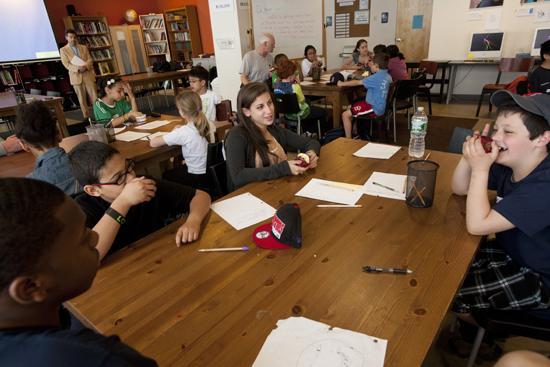Great Books, Good Works
Community service on CGS lit class syllabus

Rachel Regent (CGS’13) tutored young writers at 826 Boston recently as part of her literature class. Photos by Vernon Doucette
The city wants to pave over your block and school for a new highway—how would you fight the demolition? Sandwiched between several children at 826 Boston, a Roxbury nonprofit that tutors kids in writing, volunteer Rachel Regent coaxes her seatmates to pen what they’d do.
“Nothing. I don’t like school,” says nine-year-old Jacob, facing her across the wooden table under his Red Sox cap.
“Yeah, but they’re taking your house, too,” Regent (CGS’13) reminds him.
“Have a competition between who could eat the most hamburgers,” says Rafael, 10, apparently intending that the winner keep the real estate.
“Oooh, yeah, write that down,” says Regent. “That’s funny.”
Amid chitchat about the Red Sox—Regent shows she’s cool by citing the 18-3 score of the previous day’s blowout by Texas—she gently prods Karim, a quiet eight-year-old in T-shirt and madras shorts. “What would you do if somebody was trying to tear down your house?”
“Run for my life?” he says shyly.
Regent laughs. “Would you bring your family with you? Where would you go? The police? Karim, why don’t you write that down—call the police. It’s a good idea.”
Who says English lit is for the ivory tower and not the real world? In Sheila Cordner’s Breaks with Tradition class, studying great books (plus the occasional film) and doing good works go hand in hand. This semester, besides 826 Boston, Cordner’s College of General Studies students have volunteered at such places as Hale House, a senior citizen residence in Boston’s Back Bay, to participate in its book club discussion, and the Anna Bissonnette House for low-income and formerly homeless elders in the South End, where students and residents discussed The Searchers, a movie they’d studied. Service and syllabus are related: students write an essay connecting their volunteer work to what they’ve read in class—literature that broke new, creative trails, including Dickens’ Hard Times, Ibsen’s A Doll’s House, and Vonnegut’s Slaughterhouse Five.

“Something we talk a lot about in the class is the artists’ or writers’ vision of their works and the processes that they use in order to convey their visions to the world,” says Regent. She found a similar dynamic at work in her day in Roxbury: “I thought that 826 Boston really strived to teach kids as much as they can about creativity and making masterpieces of their own. They taught them how to make unique works of art and how to express their views and ideas in many different ways, which in some sense is what the humanities are all about.”
Molly Trillo (CGS’13), who also volunteered at 826 Boston, cites another exercise, in which the children created protest chants against bullying. When an 826 staffer explained how stressing certain syllables and not others could alter a word’s effect, Trillo realized she’d taken that effect for granted while reading poetry in the class. “It really helped me gain a deeper understanding for poems,” she says.
Since 2009, CGS instructor Cordner (GRS’12) has offered her humanities students a service stint as an alternative to a traditional research project, partly to marry her twin interests in literature and volunteering. But there’s also a pedagogical purpose: “I try to get students to think about the relationship between what they are studying and the outside world—and how poets or artists have envisioned their role in society.” Her approach earned her a speaker’s slot at BU’s annual Instructional Innovation Conference in March.
A BU colleague says community service can enhance teaching in other disciplines. Scott Seider, a School of Education assistant professor, coauthored a study last year of a Boston College program combining philosophy and theology classwork with yearlong community service. The study reports that students “demonstrated a significant increase in their interest in philosophy” and were more likely to take additional philosophy courses. Participating students told the researchers that service “highlighted philosophy’s relevance to the ‘real world.’”
Cordner says that feedback from her students supports Seider’s study. “I definitely notice a higher level of engagement and rigor and more engaged class participation,” she says. It’s especially striking when students who are quiet in class “experience the link firsthand between the literature and the service project. They’re more likely to jump into course discussions” afterward. “They speak with maybe a little bit more authority, because they’ve experienced this.”
Comments & Discussion
Boston University moderates comments to facilitate an informed, substantive, civil conversation. Abusive, profane, self-promotional, misleading, incoherent or off-topic comments will be rejected. Moderators are staffed during regular business hours (EST) and can only accept comments written in English. Statistics or facts must include a citation or a link to the citation.